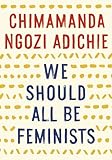 I read Chimamanda Ngozi Adichie’s Americanah in January of 2016, back when the year, like all fresh years, seemed full of hope. I came across it in a second-hand English-language bookshop in Paris. It had been published to great acclaim a few years before, but I’d been living abroad, I’d missed the hype, and so I encountered it with that rare feeling of private wonder that comes from reading a great book one doesn’t know everyone else has already read. And it is, as I am far from the first to note, a great book — one that spans decades, continents, and cultures. Adichie’s Ifemelu, a Nigerian immigrant to the U.S., takes apart the American constructions of race and identity as only an outsider can. Like all great books, it is also a deeply personal story, with lines that pierce and transcend: “Sometimes she worried that she was too happy. She would sink into moodiness, and snap at Obinze, or be distant. And her joy would become a restless thing, flapping its wings inside her, as though looking for an opening to fly away.” I wanted to give the book to everyone I knew, but many of them had read it, so I gave it to my mother. She had immigrated to New York from Paris as a teenager, and she found kinship in that outsider’s eye.
I read Chimamanda Ngozi Adichie’s Americanah in January of 2016, back when the year, like all fresh years, seemed full of hope. I came across it in a second-hand English-language bookshop in Paris. It had been published to great acclaim a few years before, but I’d been living abroad, I’d missed the hype, and so I encountered it with that rare feeling of private wonder that comes from reading a great book one doesn’t know everyone else has already read. And it is, as I am far from the first to note, a great book — one that spans decades, continents, and cultures. Adichie’s Ifemelu, a Nigerian immigrant to the U.S., takes apart the American constructions of race and identity as only an outsider can. Like all great books, it is also a deeply personal story, with lines that pierce and transcend: “Sometimes she worried that she was too happy. She would sink into moodiness, and snap at Obinze, or be distant. And her joy would become a restless thing, flapping its wings inside her, as though looking for an opening to fly away.” I wanted to give the book to everyone I knew, but many of them had read it, so I gave it to my mother. She had immigrated to New York from Paris as a teenager, and she found kinship in that outsider’s eye.
 By the spring of 2016, I had gotten myself a copy of Adichie’s brilliant essay, now in book form, We Should All Be Feminists. I considered myself a fan, but then in August I found myself on stage, unwillingly competing in a literary spelling bee, blushing bright red as I misspelled Adichie’s final “ie.” Compared to some of the Polish authors included, I had been given one of the easier names to spell. 2016 had begun to take its nose dive towards the worst. In November, I no longer wanted to read novels. I wanted something to dispel the grief I felt for my country, something so current, so now, that novels, with their grand slowness, couldn’t get there fast enough. But Adichie could. Her article on the New Yorker’s website, “Now Is the Time to Talk About What We Are Actually Talking About,” reached out to me with its steady drum beat rhythm. “Now is the time, Now is the time, Now is the time,” Adichie repeats, as if answering the Jewish theologian Rabbi Hillel’s age old question: “If not now, then when?” Her sentences cut sharp and unforgiving. “America loves winners, but victory does not absolve,” she writes. Her clarity, the precision of her proscriptions, stopped my hands from wringing. The essay swayed me from stasis towards fervor. In the end, she reminds, “It doesn’t have to be this way.” And it doesn’t. A new year begins.
By the spring of 2016, I had gotten myself a copy of Adichie’s brilliant essay, now in book form, We Should All Be Feminists. I considered myself a fan, but then in August I found myself on stage, unwillingly competing in a literary spelling bee, blushing bright red as I misspelled Adichie’s final “ie.” Compared to some of the Polish authors included, I had been given one of the easier names to spell. 2016 had begun to take its nose dive towards the worst. In November, I no longer wanted to read novels. I wanted something to dispel the grief I felt for my country, something so current, so now, that novels, with their grand slowness, couldn’t get there fast enough. But Adichie could. Her article on the New Yorker’s website, “Now Is the Time to Talk About What We Are Actually Talking About,” reached out to me with its steady drum beat rhythm. “Now is the time, Now is the time, Now is the time,” Adichie repeats, as if answering the Jewish theologian Rabbi Hillel’s age old question: “If not now, then when?” Her sentences cut sharp and unforgiving. “America loves winners, but victory does not absolve,” she writes. Her clarity, the precision of her proscriptions, stopped my hands from wringing. The essay swayed me from stasis towards fervor. In the end, she reminds, “It doesn’t have to be this way.” And it doesn’t. A new year begins.
More from A Year in Reading 2016
Don’t miss: A Year in Reading 2015, 2014, 2013, 2012, 2011, 2010, 2009, 2008, 2007, 2006, 2005









